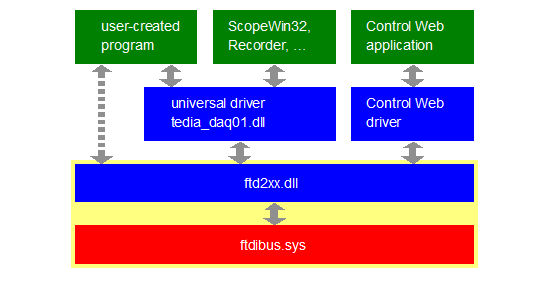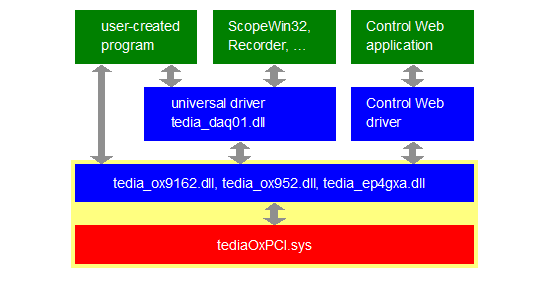Windows drivers & software
TEDIA as a hardware producer provides universal drivers for Windows operating systems as well as special drivers for some frequently used development environments and applications for signal measurement and data processing. Tools for configuring and testing product features are also provided.
DAQ USB modules Windows drivers
The diagram below shows the structure of the DAQ USB modules drivers for Windows operating systems.

DAQ USB modules use by Future Technology Devices International Limited (FTDI) controllers including the original, but modified, Windows systems driver (highlighted with the yellow background on the diagram). This driver is mandatory to the module's operation and mainly includes ftdibus.sys (running in the Windows kernel) and the ftd2xx.dll library on the application layer providing the interface for the users programs.
In principle, user programs can use the system driver's interface (ie. ftd2xx.dll) directly, but using this method would require knowledge of the protocols for data transfer between the module and the computer. In justified cases (e.g. development of custom Windows or Linux drivers), a detail description of the DAQ USB modules communication protocols can be provided.
The standard way for module programming is, however, to use a library that wraps the communication protocols with a layer and abstraction API. The modules are therefore supplied with a universal driver called TEDIA_DAQ01. This driver does not support DAQ USB modules only, but also DAQ PCI cards in one software package.
The universal driver mentioned above is used a variety of other programs or development environments (e.g. TEDIA Recorder, ScopeWin32 or Promotic) and its API is compatible with LabVIEW (National Instruments).
Some other programs or development environments require drivers with a special API, such as Control Web system shown in the figure above.
While the system driver is installed with system procedures when the module is first connected to the computer, optional libraries with abstract API are installed manually (if needed).
DAQ PCI Express cards & DAQ PCI cards Windows drivers
The diagram below shows the structure of the DAQ PCIe/PCI cards drivers for Windows operating systems.

DAQ PCIe/PCI cards use controllers supported by the driver developed by TEDIA (highlighted with the yellow background on the diagram). This driver is mandatory to the module's operation and mainly includes tediaOxPCI.sys (running in the Windows kernel) and three libraries (tedia_ox9162.dll used by first generation PCI cards, tedia_ox952.dll used by second generation PCI cards and tedia_ep4gxa.dll used by PCIe cards) on the application layer providing the interface for the users programs.
Just as in the case of DAQ USB modules, user programs can use the system driver's interface (ie. three libraries mentioned above) directly. But this method, unlike the modules, is frequently used, because...
- libraries have a very simple and understandable interface (allow access to the card registers, capture interrupts etc.),
- the cards have functionally native registry structure unified for the entire group of cards (especially PCIe cards),
- allows support for newly-added features, as well as custom-made functionalites
- and finally - the entire programming code is very thin.
There is no need for kernel programming knowledge when using the system driver, the whole user program runs in user-space.
The second way for DAQ PCIe/PCI card programming is to use a library that wraps registry structure and service procedures with a layer and abstraction API. DAQ PCI cards are therefore supplied with a universal driver called TEDIA_DAQ01. This driver does not support DAQ PCI cards only, but also DAQ USB modules in one software package (DAQ PCIe cards will be added soon).
The universal driver mentioned above is used a variety of other programs or development environments (e.g. TEDIA Recorder, ScopeWin32 nebo Promotic) and its API is compatible with LabVIEW (National Instruments).
Some other programs or development environments require drivers with a special API, such as Control Web system shown in the figure above.
While the system driver is installed with system procedures when the module is first connected to the computer, optional libraries with abstract API are installed manually (if needed).
MicroUnit I/O modules software support
MicroUnit I/O modules use the RS-485 standard interface with the Modbus RTU protocol, therefore there is no need for any special programming support. Modules can be included in networks with third-party equipment and can be easily connect to any Modbus master controller based on PC or PLC. That is the easiest way how to use MicroUnit modules.
Moreover, modules also support channel-oriented AIBus-2 protocol. In case of use modules in this mode, there are several type of dedicated cards (PCI, ISA, PC/104) and LAN/RS-485 converters available. Please contact technical support for more information.
Note: Some programs and development environments (e.g. TEDIA MU Datalogger, Promotic or Control Web drivers) use AIBus-2 protocol mode. In this case, MicroUnit modules can not share the RS-485 line with third-party Modbus equipment. For more information, please refer to these programs and development environments description.
COM PCIe cards Windows drivers
COM PCIe cards use ASIX Electronics controllers including the original, but modified, Windows systems drivers.
For more information, please refer list of supported Windows systems.
COM PCI cards Windows drivers
COM PCI cards use Oxford Semiconductor controllers including the original, but modified, Windows systems drivers.
For more information, please refer list of supported Windows systems.
COM USB converters Windows drivers
COM USB converters use Future Technology Devices International Limited (FTDI) controllers including the original, but modified, Windows systems drivers.
For more information about supported Windows systems, please refer Download section.
COM converters software support
Converters do not require any driver.
Converters are supplied with software utility for setting of communication parameters. For more information, please refer Download section.
Software utility does not require any driver, but a corresponding COM port.

